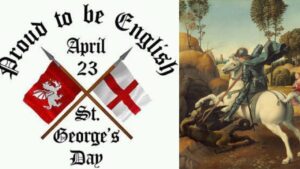
“Unveiling England’s Complex Narratives: From St. George’s Day to Political Crossroads”
The majority of people are unlikely to give any thought to the fact that today is St. George’s Day, which honours a long-dead Roman soldier and has about as much historical basis in England as the dragon it is alleged he slayed.
Sometimes right-wing provocateurs mess with the day. However, folklore in England is fascinating beyond politics. Strongly contested notions about this nation have generated a contentious and long-lasting discussion about its future during the last ten years.
Regaining English independence from Europe has been discussed by some, while others long for a time when the Royal Navy dominated the seas and “Global Britain” was the norm. Some have asserted their moral superiority, putting those they considered “civilised” above those they considered “savage,” while yet others are drawn to the myth of a magical island that has the power to stand against the world or even change its course.
Though probably never more so than during election years when these major mythologies have been pitted against the everyday ideas of locals, the tales we tell about ourselves always matter.
A contentious discussion is already taking place about the recent wave of disillusioned voters who are crossing the Channel, how English white working-class voters see themselves—whether as a cohesive group or as cultural warriors divided between leftist and rightist ideologies—and how politicians are preparing for what could be a pivotal general election.
But a sizable majority of English people do not wish to completely forget their nation’s past, according to this week’s polling from the More in Common and USL Policy Lab. Though the headlines would have you believe differently, only 13% of English voters said their country was “awake.”
While Keir Starmer accuses the Conservatives of having “lost the right to call themselves the patriotic party” and of having “no time for people who hesitate to fly our flag,” Labour finds encouraging results that go against popular opinion—despite the fact that 25% of their voters might find it difficult to walk through areas where the St. George’s cross is on display.
Co-authored by Mark Stears of the USL and myself, a new book was released this week that aims to debunk common grand myths in England that are laced with rhetoric of national exceptionalism and weariness. Rather, our goal is to present more subdued tales that delve into the nuances of a country that is never quite what it seems but has a profound impact on individuals from all walks of life.
By explaining seven locations associated with seven myths, we want to provide some guidance to Starmer—a self-aware ordinary person who led a major political party for almost 30 years—while two authors from opposing sides of the spectrum step aside. But in the process of attempting to characterise the seven myths associated with the seven sites, we have also attempted to present an alternative, and presumably more English, viewpoint in order to address the main issues that politicians on all sides are confronting.
For example, England should have a relationship with the air and water, given its long history of maritime trade and its coastal landscape. Nowhere is this more true than Plymouth, a city whose identity is inextricably linked to the legend of Francis Drake. Plymouth is currently setting the standard for floating windfarm technologies worldwide. These ugly new contraptions, while lacking in glitz and glamour, may have greater bearing on the security of our country now than they had when they were daring sea dogs and sometimes pirates in the sixteenth century.
Comparably, the idea that Britain stood up to Nazi Germany alone was never entirely accurate because it disregarded Britain’s significant imperial efforts. Hanif Powell, on the other hand, believes that the entrance of migrants from the “new Commonwealth threatens England’s destruction” and that this has altered the belief that we need someone other than ourselves.
Wolverhampton Wanderers demonstrates why they were mistaken after serving as the city’s MP for such a long time. Disagreements have been lessened thanks to the club’s community outreach initiatives. Local Sikhs can even bring their dhols to the Punjabi Wolves section during games.
At least eight of the ten most impoverished council wards in England are located in Blackpool, making it a centre of poverty. Because of this, the city has come to represent white working-class people who supported Brexit in 2016, according to several pundits. Politicians have since made bold promises to expand or perhaps completely change it. It’s similar to Northern California’s Silicon Sands, with the exception that not much money has gone towards the one thing Blackpool really needs more of.






